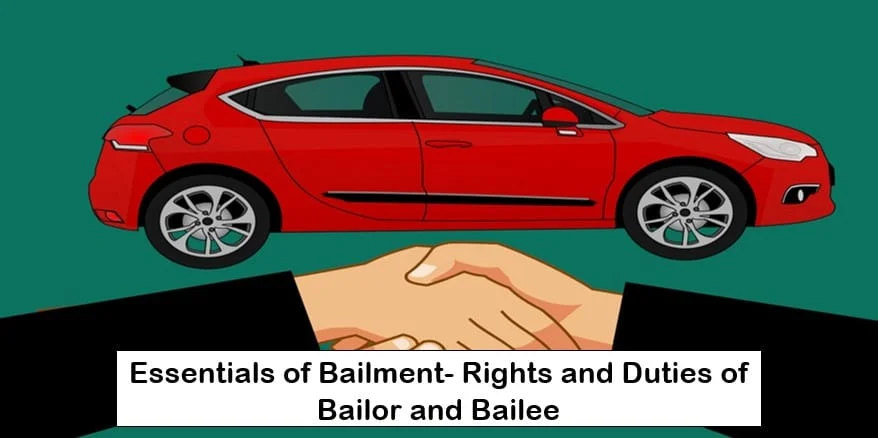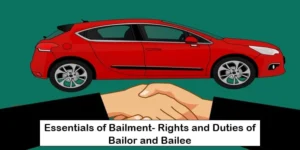

Duties for both bailor and bailee
Duties of the bailor
- To reveal defects in the product
It is the bailor’s duty to disclose to the bailee every flaw in the goods. In the event that he does not, the bailor is accountable to the bailee for any damages resulting from that error.
For instance, ‘X’ borrowed ‘Y’s’ car in order to go on vacation. ‘Y’ knew something wasn’t right with the brakes. But he didn’t let ‘X’ know about it. The brakes fail, causing “X” to be in an accident. All of the losses that “X” sustained in this accident will be “Y’s” fault. - To pay for unexpected and necessary costs
All unusual and necessary costs made by the bailee to protect the commodities bailed must be reimbursed by the bailor to the bailee.
For instance, when “A” had to travel for work, he gave his friend “B” his cat. “A” is responsible for covering the cost of the cat’s daily needs, including food and shelter. In addition, “A” will be responsible for covering any further costs, such as daycare, a doctor’s bill, etc., if keeping the cat safe required it.3. To pay back the bailee for all damages
According to Section 159 of the Indian Contract Act, the bailor must compensate the bailee for any losses if the bailor requests his goods before the time specified in the contract. In accordance with Section 164, in the event that the bailor willfully releases goods with a defective title, the bailee may also pursue losses from the bailor.
4. To collect the bailed goods
After the period for which the goods were bailed has passed, the bailor is required to retrieve his belongings. The bailor will be responsible for covering the bailee’s losses if he is unable to retrieve the goods by the end of the bailment period.
For instance, “X” bailed his dog with “Y” for a week, and he returned ten days later to retrieve his pet. “X” shall reimburse “Y” for the costs expended in keeping the dog safe for those additional three days.Duties for the bailee
1. To properly handle the products and goods.
“In all cases of bailment the bailee is bound to take as much care of the goods bailed to him as a man of ordinary prudence would, under similar circumstances, take of his goods of the same bulk, quantity, and value as the goods bailed,” states Section 151 of the Indian Contract Act, 1872. However, Section 152 states that “If the bailee has taken the amount of care described in Section 151, he is not responsible for the loss, destruction, or deterioration of the thing bailed, in the absence of any special contract.”For instance, “A” bailed his car with “B” for a week. If “B’s” carelessness results in “A’s vehicle being damaged, “B” will be responsible for paying for the damages. However, “B” will not be responsible for any losses if the vehicle sustains damage as a result of an earthquake or flood.
2. To only use the products for the intended purpose
It is the bailee’s obligation to utilize the products exclusively for the purposes permitted by the terms of the contract. The bailor has the right to declare the entire contract void if it is discovered that the items are being used for unapproved reasons. Section 154 states that “the bailee is liable to make compensation to the bailor for any damage arising to the goods from or during such use of them if he makes any use of the goods bailed which is not according to the conditions of the bailment.”Examples include:
(a) “A” lends “B” a horse so he can ride it for himself alone. “B” permits “C,” a relative of “B,” to ride the horse. Although “C” rides carefully, the horse gets hurt when it unintentionally falls. “B” is responsible for compensating “A” for the harm the horse sustained.
(b) “A” specifically hires a horse from “B” in Calcutta in order to march to Banaras. A rides cautiously, but instead marches to Cuttack. Unintentionally falling, the horse sustains injuries. “A” is responsible for compensating “B” for the harm done to the horse. -
To maintain the separated bailed items
In order to guarantee the safe return of the goods, the bailee should store each item that is bailed separately and securely. On the other hand, a few clauses address combining bailed items.1. Section 155: Both the bailor and the bailee shall have an interest, in proportion to their respective shares, in the mixture so formed if the bailee, with the approval of the bailor, mixes the bailor’s goods with his own goods.
2. Section 156: It states that if the bailee mixes the bailor’s goods with his own without the bailor’s permission and the goods can be divided or separated, the property in the goods remains with the respective parties. However, the bailee is responsible for paying the costs associated with dividing or separating the goods as well as any damages resulting from the mixture.
3. Section 157: The bailor is entitled to compensation from the bailee for the loss of the goods if the bailee, without the bailor’s consent, combines the bailor’s goods with his own in a way that makes it impossible to separate the bailed goods from the other goods and deliver them back.4. To return any profits generated by the products
If any profit has been made from the bailed items throughout the bailment process, the bailee is required to give it to the bailor.
As an illustration, let’s say “A” bail his cow with “B” for seven days. Every day, the cow produces milk. Throughout the bailment era, “B” sold this milk. When returning the items, “B” must give “A” the profit she made from selling the milk. - To send the products back
After the commodities are used for the intended purpose or the contract’s duration has passed, the bailee is required to return the goods to the bailor. The bailor’s discretion must be followed in making this repayment.The bailor and bailee rights
Bailor rights: - To receive payment for any unauthorized use
The bailee shall be responsible for any damages resulting from the use of the products for any purpose not permitted by the terms of the contract.
For instance, “X” bailed out his car to “Y” for a month. It was stipulated in the contract that “Y” may utilize the car for his own purposes. But when “Y” let his brother “Z” to operate the car, “Z” caused an accident. ‘Y’ will now be responsible for the harm done to the car.2. To terminate the agreement
A contract of bailment is voidable at the bailor’s discretion if the bailee takes any action pertaining to the commodities bailed that is inconsistent with the terms of the bailment, according to Section 153 of the Act.
Example: “A” rents out a horse to “B” so that he can ride it for himself. The horse is driven by “B” in his carriage. This is a termination of the bailment at ‘A’s discretion.4. To earn any profits generated by the products
When items are bailed, the bailor is entitled to any profit that results from them. The bailor may take appropriate action against the bailee to recover such an amount if the bailee refuses to pay such profits to him. - To receive the items returned when the contract expires
After the contract expires, the bailor is entitled to receive the things that were bonded. On the other hand, in the event of a gratuitous bailment, the bailor may redeem the goods prior to the contract’s expiration. In such a case, the bailor is responsible for any losses the bailee sustains as a result of the items’ early return.Rights of the bailee
1. To receive compensation
Any losses incurred as a result of a flaw in the products are compensable to the bailee. In the event of a gratuitous bailment, the bailee may sue the bailor for damages if the bailor requests that the items be returned before the contract expires and the bailee incurs losses as a result.
2. To be compensated for costs incurred
All costs required for the maintenance of the commodities bailed must be reimbursed to the bailee by the bailor. Additionally, the bailee is entitled to reimbursement for any out-of-the-ordinary expenses incurred while the items were being bailed.
3. To stop the delivery of goods
If the bailee discovers that the bailor lacks title to the goods, the bailee has the authority to halt the delivery of the commodities. In the event if a third party asserts ownership of the items, the bailee may also halt the same.
4. Encroach on the bailed goods
A lien is a legitimate claim made on the property used as security to pay off the debt. If the bailor withholds any compensation or payment that he is obligated to make, the bailee has the right to place a lien on the bonded goods.





